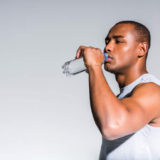

You are at an outdoor festival on a hot summer day, having a good time listening to some music and shopping at the stands. Suddenly you realize you are getting a headache. A short time later, you begin to feel tired and a little nauseated. When you mention to your friend that you are not feeling well, she comments that you may be dehydrated and your symptoms may be the outcome of this condition.
What Is Dehydration?
Dehydration is simply a lack of fluids in the body as a result of taking in less fluid than is lost through normal body functions, such as urination and sweating. Common causes of dehydration include high temperatures, exercise, vomiting or diarrhea. Most cases of mild dehydration can be reversed by drinking fluids, with water being the best choice.
Experts tell us that a loss of 3% of body weight defines dehydration. The World Health Organization (WHO) shows that the average consumption of water per capita is less than 2 liters. This coincides with the suggested 1.9 liters from experts and which equals the eight, 8-ounce glasses typically recommended.
But actual fluid loss is determined by many factors, including body size, fat and muscle composition, activity levels, breathing rates, environment, sex and age. For example, those at higher altitudes will lose more water through increased breathing rates, as the moisture is lost during exhalation.
Who Is at Higher Risk for Dehydration?
- Athletes need to be aware of how much they are sweating. Dehydration can be cumulative over a period of several days, so exercise can cause dehydration even with a moderate regime. Athletes need to be even more aware in mild or colder weather, as they may be sweating more than they realize. It is important to replace the fluids lost while sweating.
- Elderly people (especially those who need care) and children are also at a high risk of becoming dehydrated. If an elderly person or child suffers from serious diarrhea or vomiting, cannot keep liquids down, or becomes confused and disoriented, consult a physician as there may be underlying conditions or unanticipated consequences of dehydration. Knowing the general signs of dehydration can help in spotting the condition in these populations.
Signs and Symptoms of Dehydration
- Symptoms of mild dehydration include dry mouth, tiredness, thirst, a decrease in urine, headache, dizziness and becoming lightheaded.
- Severe dehydration can include symptoms of extreme thirst, constipation, irritability, confusion, dry skin that lacks elasticity, dry mucous membranes, lack of urination, sunken eyes, and low blood pressure – which can result in a rapid heartbeat and even delirium or unconsciousness.
Dehydration can be a serious condition and, unless rectified, can begin to cause significant damage in the body. Eventually, dehydration can result in muscle cramps, heat exhaustion and heat stroke. Extreme cases can result in kidney failure and seizures as the electrolytes become depleted.
How to Resolve Being Dehydrated
Unless there is some other factor that prohibits keeping fluids down, such as an illness, most dehydration can be resolved simply by drinking enough fluids. Water is the best choice as beverages containing alcohol or caffeine may actually cause further fluid loss.
Monitoring fluid intake during the hot summer months may help in avoiding the unpleasant and potentially dangerous symptoms that result from dehydration. So the next time you are spending a hot summer day at a festival, be sure to stop and get a nice, cold lemonade!





Organic plain coconut water best liquid to keep hydrated and keep in check…natural sugar & electrolytes